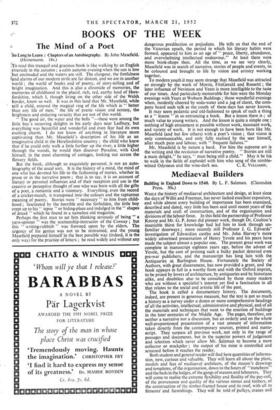BOOKS OF THE WEEK
The Mind of a Poet
So Long to Learn : Chapters of an Autobiography. By John Masefield. (Heinemann. 18s.) i; !lb read this tranquil and gracious book is like walking by an English 'riverside in the autumn ; a calm autumn evening when the sun is low but unclouded and the waters are still. The clangour, the fretfulness land alarms of our modern strife are far distant, and we are in another world ; the world of books and of poetry, of story-telling and of bright imagination. And this is also a chronicle of memories, the 'memories of childhood in the placid, rich, red, earthy land of Here- fordshire, which 1, though living on the other side of the Welsh border, know so well. It was in this land that Mr. Masefield, while still a child, entered the magical ring of the life which is " better than any life of men," the life of poetic vision and ecstasy, the brightness and enduring veracity that are not of this world.
" The good air, the water and the bells "—these were among the little boy's recurring delights in his early days near Ledbury, but everything was beautiful and wonderful and even fear had its own exciting charm. I do not know of anything in literature more captivating than Mr. Masefield's description of his life as an imaginative child in the Herefordshire country - the child who knew that if he could only walk a little further up the river, a little higher through the woods, he would then discover Paradise, with God himself, in the most charming of cottages, looking out across the flowery fields.
But the book, although so exquisitely personal, is not an auto- biography of the usual sort. It is the history of a mind, the mind of one who has devoted his life to the fashioning of stories, whether in prose or in the narrative poem ; that is to say, it is an account of literary or personal influences and of their reception and use in the creative or perceptive thought of one who was born with all the gifts of a poet, a romantic and a visionary. Everything, even the record of a cricket-match, is transposed into the colours and the rapturous meaning of poetry. Stories were " necessary " to him from child- hood ; fascinated by the horrible and the forbidden, the little boy crept up to his " tepee " or hiding-place and indulged in the " shapes of dread " which he found in a nameless old magazine.
Perhaps the first man to set him thinking seriously of being " a yarn-spinner " was the seamanship-instructor of the Conway; but this " writing-rubbish " was frowned upon by the elders. The urgency of his genius was not to be restrained, and the young Masefield prepared himself in the best possible way (indeed, it is the only way) for the practice of letters ; he read widely and without any dangerous predilection or prejudices. He tells us that the end of the Victorian epoch, the period in which his literary habits were formed, appeared to him as an age of " peace, liberty, abundance, and overwhelming intellectual endeavour." At least there were more book-shops then. All the time, as we see very clearly, Masefield was in search of narrative, stories of people and events, to be coloured and brought to life by vision and artistry working together.
To modern youth it may seem strange that Masefield was attracted so strongly by the work of Morris, FitzGerald and Rossetti ; the later influence of Nevinson and Yeats is more intelligible to the taste of our times. And particularly memorable for him were the Monday evenings with Yeats at Woburn Buildings ; those wonderful evenings when, modestly cheered by soda-water and a jug of claret, the com- pany heard such talk as the youth of these days has never known.
It may seem pedantic and old-fashioned to speak of such a thing as a " lesson " in so entrancing a book. But a lesson there is ; of much value to young writers. And the lesson is quite a simple one : nothing of high attainment is possible without work, incessant work, and variety of work. It is not enough to have been born like Mr. Masefield (and but few others) with a poet's vision ; that vision is only communicable, and only fully realised by the seer himself, after much pain and labour, with "'frequent failures."
Mr. Masefield is by nature a bard. For him the supreme art is the writing and the recitation of narrative poetry. " Stories are still a main delight," he says, " man being still a child." May it be his to walk in the fields of asphodel with him who sang of the nimble- witted Odysseus and the wine-dark sea. C. E. VULLIAMY.


































 Previous page
Previous page